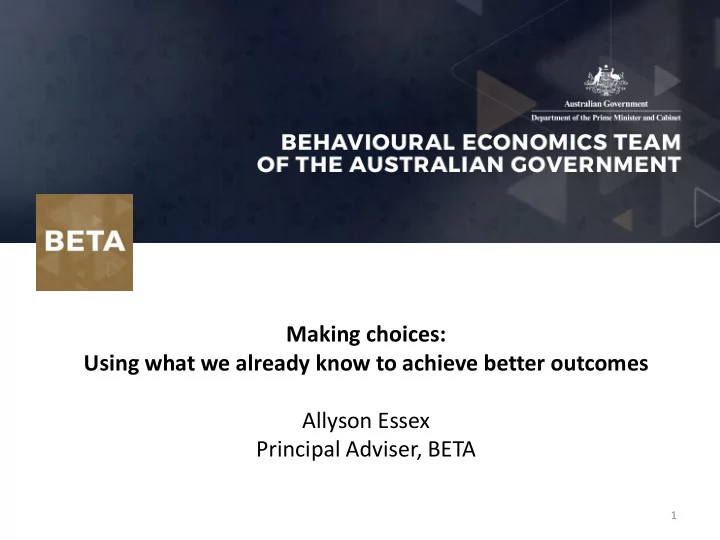

Making choices: Using what we already know to achieve better outcomes Allyson Essex Principal Adviser, BETA 1
I’ve got a great idea! 2
Issksksk Case study – Israeli daycare centres Israeli daycare centres had a problem with parents arriving late to collect their children, forcing teachers to stay after closing time. They introduced a monetary fine for late-coming parents… 3
Case study – Israeli daycare centres In daycare centres where the fine was introduced, parents immediately started showing up late; lateness levelled out at twice the pre-fine level. Introducing a fine caused twice as many parents to show up late! 4
Case study – Scared Straight program 5
Case study – Infant simulators 6
Show me the data 7
Show me the data www.data.gov.au 8
Rational vs irrational brain 9
The reality of human behaviour People do not: • have access to perfect information • possess unlimited cognitive abilities • demonstrate complete self-control • ignore fairness or the welfare of others Choice aversion Salience Loss aversion we procrastinate and stick we pay attention to what is we dislike losses more than with the status quo novel and relevant to us we like gains Social Norms Present Bias Over-confidence we are influenced by the we value the present over the we overestimate the (perceived) behaviours of future likelihood of the good others 10
Randomised controlled trials 11
Examples Early evidence of impact • Messages that told people the most people in their community pay their taxes on time increased payment rates by 15% (UK) • Electricity bills comparing usage to “your most efficient neighbours” reduced consumption by 2-4% (US) • Messages that encouraged organ donation by an appeal to reciprocity led to 100,000 extra donors per year (UK) • Planning prompts increased immunizations by 12% (US) • Personal commitment techniques helped get injured employees back to work 27% faster than usual (NSW) 12
Who we are BETA is the Australian Government’s first central unit dedicated to the application of behavioural economics to policy, programme, and administrative design. Our mission is to build behavioural economics capability across the APS and drive its use in policy design and delivery, using randomised controlled trials to test what works. To do this we: • build APS capability through training and tools Professor Michael Hiscox • apply behavioural economics expertise to BETA Director policies and programmes Clarence Dillon Professor • establish links between the APS and academia at Harvard University and member of Harvard BIG. • are working on more than 20 behavioural economics projects. 13
Partners BETA partner agencies Department of Education Department of the Prime Department of the and Training Minister and Cabinet Environment and Energy Department of Industry Department of Health Office of the Fair Work Ombudsman Department of Foreign Treasury National Disability Affairs and Trade Insurance Agency Department of Department of Human Australian Taxation Office Communications Services Department of Social Department of Australian Public Service Services Employment Commission And our latest partners….Department of Infrastructure and Regional Development and Department of Agriculture and Water Resources. 14
For more information Any questions? For more information: www.pmc.gov.au/beta Follow us on Twitter: @beta_gov_au 15
Recommend
More recommend